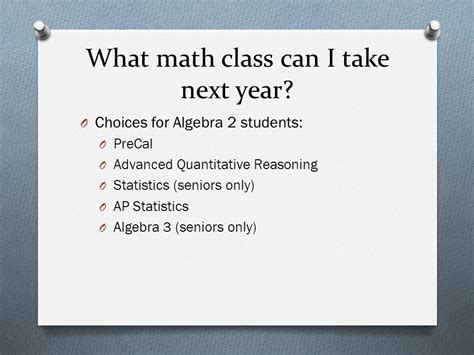As a senior in high school, you may be wondering what math class you should take. There are many different options available, and the best choice for you will depend on your individual needs and goals.

College Preparatory Math Courses
If you are planning to attend college, you will need to take a college preparatory math course. These courses will provide you with the foundation in mathematics that you need to succeed in college-level math courses.
The most common college preparatory math courses are:
- Algebra II
- Pre-calculus
- Calculus
Algebra II is a required course for all college-bound students. It covers topics such as linear equations, quadratic equations, and polynomials.
Pre-calculus is a recommended course for students who are planning to take calculus in college. It covers topics such as trigonometry, logarithms, and limits.
Calculus is a challenging but rewarding course that is typically taken by students who are planning to major in math, science, or engineering in college. It covers topics such as derivatives, integrals, and differential equations.
Non-College Preparatory Math Courses
If you are not planning to attend college, you may still want to take a math course in your senior year. There are a variety of non-college preparatory math courses available that can help you prepare for the workplace or other post-secondary education options.
Some of the most common non-college preparatory math courses include:
- Consumer Math
- Business Math
- Statistics
Consumer Math is a practical course that covers topics such as budgeting, taxes, and credit cards.
Business Math is a course that covers topics such as accounting, finance, and marketing.
Statistics is a course that covers topics such as data analysis, probability, and inference.
Choosing the Right Math Class for You
The best math class for you will depend on your individual needs and goals. If you are planning to attend college, you will need to take a college preparatory math course. If you are not planning to attend college, you may still want to take a math course in your senior year, but you can choose from a wider variety of non-college preparatory math courses.
Here are some factors to consider when choosing a math class:
- Your future plans
- Your strengths and weaknesses in math
- Your interests
- Your schedule
Talk to your math teacher, guidance counselor, or parents to get more information about the different math courses available to you and to help you choose the right one for you.
Benefits of Taking Math in High School
There are many benefits to taking math in high school. Math can help you develop your critical thinking skills, problem-solving skills, and communication skills. It can also help you prepare for a variety of careers and post-secondary education options.
Here are some of the benefits of taking math in high school:
- Improved critical thinking skills Math requires you to use critical thinking skills to solve problems. This can help you develop your ability to analyze information, identify patterns, and make decisions.
- Improved problem-solving skills Math requires you to solve problems. This can help you develop your ability to think creatively and find solutions to problems.
- Improved communication skills Math requires you to communicate your ideas clearly and concisely. This can help you develop your ability to write and speak effectively.
- Preparation for a variety of careers Math is a valuable skill for a wide range of careers. It can help you prepare for careers in fields such as engineering, computer science, finance, and business.
- Preparation for a variety of post-secondary education options Math is a required subject for admission to most colleges and universities. It can also help you prepare for a variety of post-secondary education options, such as vocational schools and trade schools.
Common Mistakes to Avoid When Choosing a Math Class
There are a few common mistakes to avoid when choosing a math class. Here are some of the most common mistakes:
- Choosing a math class that is too easy If you choose a math class that is too easy, you will not be challenged and you will not learn as much as you could.
- Choosing a math class that is too difficult If you choose a math class that is too difficult, you may become frustrated and give up.
- Choosing a math class that does not fit your schedule If you choose a math class that does not fit your schedule, you may not be able to attend class regularly and you may fall behind.
- Choosing a math class that you are not interested in If you choose a math class that you are not interested in, you will be less likely to study and you will not learn as much as you could.
Talk to your math teacher, guidance counselor, or parents to get more information about the different math courses available to you and to help you choose the right one for you.
